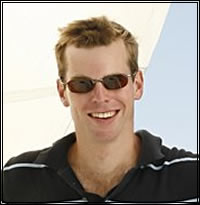 |
| Picture: 2009 Overton Prize Winner, Trey Ideker |
2009 Overton Prize: Trey Ideker
Trey Ideker initially trained in computer science. A friend who was a molecular biologist in graduate school gave him the names of potential advisors, one of who was Leroy Hood, co-founder of the Institute of Systems Biology (ISB) in Seattle, Washington. In 1996, and before the ISB was founded, Ideker moved to Seattle to join Hood as one of his first graduate students there. This move set the stage for a career that has already produced some groundbreaking work in the area of network biology.
Ideker's graduate studies coincided with the later years of the Human Genome Project. “When I joined the lab, everyone there was working on sequence analysis,” he remembers. “I was working with a talented physician and postdoc, Pete Nelson, who was studying the pathways in cells that led to the development of prostate cancer. I started trying to model these pathways; this project fell on its face, as it was far too complex for a single graduate student, but the ideas it generated have become the basis for my whole career.” Working closely with Hood, he—while still a student—was one of the first to publish an integrated computational model of a metabolic network; this paper, published in 2001, has already been cited more than 850 times.
With this very promising start, he initially moved to the prestigious Whitehead Institute for Biomedical Research in Cambridge, Massachusetts, before family drew him back to the West Coast. He is now settled at the University of California San Diego (UCSD) as an associate professor. “UCSD is a fantastic place to do science. I can't imagine being more productive anywhere else. The growth of biotechnology in the San Diego area in recent years has been overwhelming.”
While at the Whitehead Institute and in collaboration with others looking at similar problems, Ideker further developed a prototype network modelling program that he had worked on in Hood's lab into what is now the widely used online tool Cytoscape. Cytoscape is now freely available under an open source license, and this has attracted a far larger pool of both users and developers than would have been attracted to a commercial enterprise.
Ideker has been turning his attention to medical applications of network modeling. He has compared the complete map of protein–protein interactions for the malaria parasite Plasmodium falciparum, generated using the yeast-two-hybrid method, against other eukaryotic networks, and proposed unique features of its metabolism that might be targeted in designing drugs against this destructive disease. He has also showed that grouping proteins into pathways and taking the average of the levels of each protein in a single pathway can add 8%–9% to the accuracy of prognostic predictions in breast cancer. And he is about to take his involvement in medical applications to a new level, as, in mid-2009, he takes up the position of head of genetics at a new institute within the University of California San Diego School of Medicine. “I will be moving from the periphery into the center of genomics-based medical research,” he says. “My vision is to integrate network analysis into medicine and develop useful clinical tools.”
This article is excerpted from the April 2009 issue of PLoS Computational Biology. To link to the full journal article please visit www.ploscompbiol.org/article/info:doi/10.1371/journal.pcbi.1000375.



